How much do companies spend to redesign their website?
Brand Builder Solutions recently teamed up with the research team at Databox to survey close to 50 marketers and the majority are spending anywhere between $1k-10K. Another 18% of respondents said they spent between $10k-25k, while 11% spent between $25k-50k.
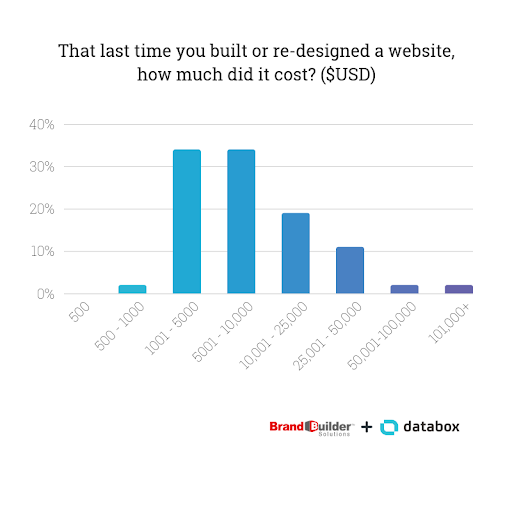
In other words, it’s often a sizable investment.
To get the most from your investment, it’s critical that you hire the right agency for the project.
In order to evaluate different agencies, it helps to know the right questions to ask. “A website project’s success starts and ends in the sales process. If the agency doesn’t know how to ask good questions and if the prospective client [who needs the website] isn’t asking good questions, no one’s gonna be happy,” says Joseph Jerome, owner of Brand Builder Solutions.
“That’s why I asked my sales coach in 2015, Rick Roberge, to help me write up a guide with 100 crucial questions to ask before changing your website.”
To compile the ultimate and updated list of questions and criteria from a diverse group of people, Databox also asked these same 50 marketers above, “What question should someone ask before hiring a web design/development agency to do a new site build or redesign?”
These respondents have a lot of experience in design, both for their own companies and for clients. Many of them, 58% to be exact, have at least one or two designers on staff, so they know the types of information needed to succeed in a redesign project.
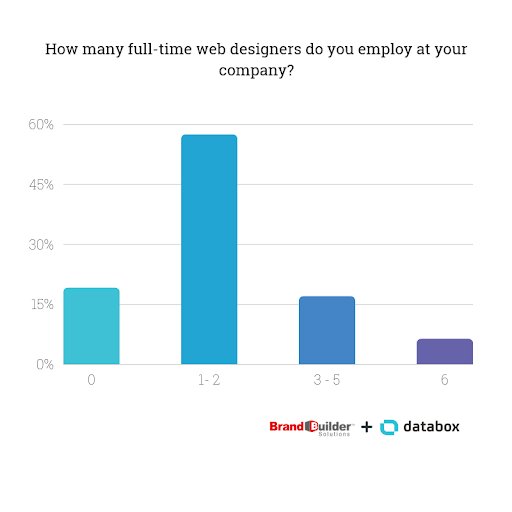
And many of them have a couple developers on staff, too.
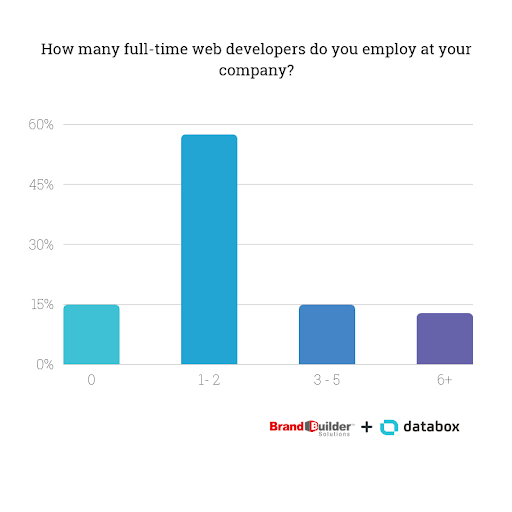
We made sure to include insights from companies that design and develop in-house as well as a few that hire design firms.
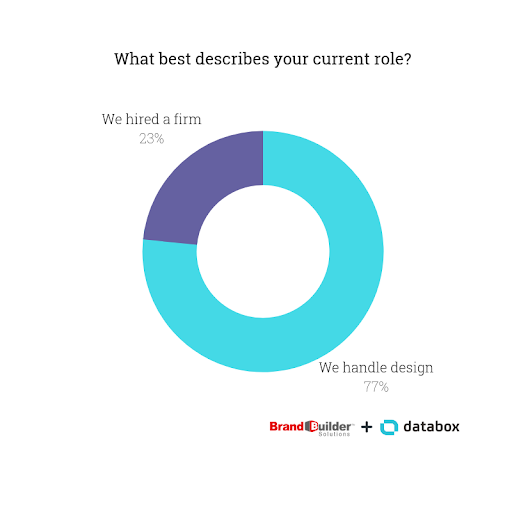
In the end, we got a lot of practical advice from people who know what they’re talking about. Here are the questions they suggested asking before you start work on a project with a web design firm, and the answers you should expect to hear.
How Will You Assess Our Business Needs?
Understanding the design/development process before it starts is important. But before you dig into that, says Alpesh Shah from RevSystems, you should find out how the firm will assess your needs.
Shah says that the ideal response from the design firm is “What is the purpose of your website?”
“Too often, sites are designed and developed without determining what the goals of the project are beyond thoughts that the site needs a ‘refresh’ because it's old. A proper project should determine what the goals of the project are, how we will measure if the project is meeting those goals and how we will make changes if we learn that goals are not being met.”
The Lead Agency’s Andrew Silcox recommends asking a similar question: “How does your development/design process focus on OUR business objectives?”
“The first principle of website design must be to help a business achieve [its] business objectives,” says Silcox. “Any new website development or redesign is a marketing investment—it requires finance and resources that cannot being utilised elsewhere. The problem we find with many web development companies is a focus on anything but the business outcomes.”
Silcox recommends getting detailed information from the design firm about the CMS, marketing, analytics, and visual branding.
How Will the Website Help Us Meet Our Goals?
Ask how the designer will “make sure that our website will attract and convert our ideal clients,” suggests Kiwi Creative’s Jen Lombardi.
Combining company goals and site visitor motivation will help the developer create a strategy that attracts leads with organic SEO and converts with great content and user experience.
“[I]t's also important to have a long-term inbound marketing plan in place to optimize your website after launch; this will ensure your site will stay relevant and provide value to your visitors for years to come,” says Lombardi.
Kalie Fry from McMahon Marketing suggests a more specific question: “What strategies will you implement to generate and nurture qualified leads?”
“In order to develop a successful website, you need to have concrete strategies for attracting visitors, nurturing them into qualified leads and gathering insights on their feelings about your products/services before they ever speak to a salesperson,” says Fry.
Impulse Creative’s Courtney Allbee expects a similar answer. “The company should expect to see data that backs up the website design/development firm's strategy, such as heat maps that demonstrate current user experience as well as a detailed plan of action that's in line with the client's goals and objectives.”
How Will the Site Perform?
Steve Yanor from Sky Alphabet encourages marketers to ask about website performance, a critical aspect of reaching your business goals.
“Too many sites are being built but then fall back in the rankings because the site hasn't respected newly established expectations of performance,” says Yanor.
“Any website in the world can be audited using Google Chrome's Website Performance audit tool. This tool is available free in the developer [tools] menu in any Google Chrome browser. Websites must now not only look great, but score better than 30. Any interview process of web development firms must include a mandatory technical review.”
How Search-Engine-Friendly Will the Site Be?
“Having a website is great,” says Natalie Athanasiadis from Ormi Media, “but unless your target audience finds your site, its wasted money for your business. Especially for new websites, you should expect that your web development firm has SEO expertise.”
“Without the SEO research and foundation you are flying blind when it comes to crafting a site that will generate revenue for your business.”
Here’s the process that Alistair Dodds from Smoking Chili recommends:
“[Clients] should expect to hear that the company fully understands the necessity of planning a site structure that will give the client the best chance of ranking for the keywords of interest to their target audience. They should expect to receive a detailed questionnaire about the products and services the client offers including a ranking of products with the highest margins and customer lifetime values.”
“From this the design agency should be able to either internally research or outsource the keyword research to an SEO agency. The resulting report should look in depth at the clients competitors keyword rankings, the full list of the niches topic-specific keywords as well as the relative competition per keyword (not Adwords competition!).”
“From here, the client should be guided as to the options per main category and which keywords should be left for future evergreen blog content. This will then provide the design agency with the outline category site structure, the target keywords and a guide to the copy per landing page.”
Nate Masterson from Maple Holistics emphasizes SEO not just now, but in the future as well: “Expect to hear that you are dealing with an experienced website building-firm that understands the importance of modular site development.”
“No firm with any success under its belt should answer with any less than assurances and promises that yes, the website they will build will be future-proof.”
“The way to identify the false promises from the legitimate ones is to ask to see a list of other websites that the company has built. Run these sites through Google's web.dev tool and you'll get an idea of how search engine-friendly and up-to-date their developments truly are.”
What Are the Details of the Design/Development Process?
Many marketers emphasized the importance of getting an overview of the entire development process.
“Be sure to ask them for a detailed outline of the entire process including all the action items that you (the client) will be responsible for,” says Ken Franzen of Neon Goldfish. “This will provide two very helpful insights.”
“First, you quickly understand how defined their process is and establish a level of confidence in the website design/development firm's ability to deliver on the project.”
“Second, this should spell out everything that will be included in the project and who is responsible for each component. This provides complete transparency to what is included in the project scope and what might result in additional fees.”
Ivana Veljovic from Aurity suggests asking for specific details: “A software company should explain everything from internal processes like managing databases and the frequency of code reviews to the staffing of the development team.”
DePalma Studios’ Jordan Schneider gives this advice:
“Any development shop worth their salt should have standard operating procedure that all teams understand and follow in order to efficiently and effectively execute the development of a website. They should be able to point to what is consistent across all projects within the process, vs. what will vary based on the needs or scope of a given project. If there's no established protocol with clear milestones, you may be dealing with an immature business.”
How Transparent Is the Development Process?
“Anyone hiring out for development should look for a company that allows for convenient project oversight,” says Benjamin Anderson from Wand.
“This enables a company to not only limit mistakes and miscommunications during development, but limits costly and time-consuming post development revisions.”
Who Will Do The Design and Development Work?
On a related note, Steven Carter from Ascend Inbound suggests asking if any of the work will be outsourced.
“Although it's not always a significant issue, many website firms will outsource work from time to time. The outsourcing could be for many reasons that are not to your benefit—the project being deemed, 'too small' for the firm, not enough available bandwidth at the time, etc.”
“Sometimes this allows for a more cost-effective [website] to be built, but it can also lead to longer turnaround times or important details getting lost.”
Joe Jerome from Brand Builder Solutions agrees that outsourcing is a potential pitfall. But, he has built his business around helping other agencies design and develop sites for their clients and has systems in place that help avoid common outsourcing issues.
He suggested looking for an agency that specializes in exactly what you need and have done it for companies like yours, even if they outsource some work to other firms, “I am seeing more and more agencies specialize their internal resources to one or two service offerings and markets, and referring other work or outsourcing other work to other specialized agencies. Agencies like Digital Growth Institute who only helps credit unions and StoryTeller Media who specializes in video and inbound marketing for private-club organizations are able to add value immediately with their core offering for their core market and rely on firms like Brand Builder Solutions for designing and developing sites on the HubSpot Content Management System.”
“On the flip side, there is no way anyone can be an expert at everything digital marketing these days. My team is often cleaning up the web development mistakes even 50 person agencies make. There’s no way smaller agencies can do it all well.”
“With specialized agencies, you can trust they have expertise doing the same kind of work and dealing with the same issues you’ll likely encounter.”
Jerome suggested asking the following questions if you discover that your agency might be outsourcing design and development:
-
“Will any part of the design or construction of our website be outsourced?
-
Why have you chosen this partner?
-
Why shouldn’t we just contract with them directly?
-
How does your partner make you (and our project) more efficient?
-
Can we speak to your outsourced partner before making a decision?
-
What are the processes you use to ensure there are no delays or miscommunication?
-
What are the milestones for the project and how will approvals work?
-
Does your partner have a team or is it just one person?
-
How many projects have you completed with your outsourced partner? How many have they completed with other agencies?
-
Does your external web design/development partner have marketing expertise, as well?
-
Does your partner have experience using website analytics, heatmap and SEO tools? Or do they just manage the graphic design and coding?
-
How will we ensure that our website can be edited without contracting with your partner again?”
Do you Start Your Design and Construction from Scratch?
“No one builds a website on their own,” says Joe Jerome from Brand Builder Solutions.
“Experienced designers and developers have a large backlog of work to call upon that helps them efficiently build a site. They also know how to leverage the work of others.”
“We have developed a process that allows us to build a custom, unique website for someone, but start with re-useable templates and template modules. This allows us to be extremely efficient and cost-effective.”
Before Kathy Heil, Partner at StoryTeller Media+Communications leveraged the Brand Builder team’s expertise and process, they ran into issues building on the HubSpot CMS, “We worked with several different web design agencies. But our sweet spot is working with HubSpot customers and it was clear they didn’t know how to build sites on HubSpot. Unfortunately, we didn’t know any better at the time.”
“With a newer client, we worked with Brand Builder Solutions to launch their website. We wouldn’t have gotten the opportunity to work with them had we not had a web design solution as part of our retainer work. Given that we have built sites with Brand Builder several times now, we were confident their templated process would enable a custom site in short-order, enabling us to get started on the marketing work quickly.”
How Mobile-Friendly Is the Design?
Matthew S. Engelson from Sagefrog recommends asking “Are you designing & developing websites with Google's mobile-first index in mind?”
Engelson notes that this isn’t the same as simple mobile-friendliness.
“The company should hear that they understand what Google's mobile-first index means. They explain that they understand if content is present on desktop and not on mobile it will NOT be in Google's index. They should also explain how important speed is when it comes to ranking highly on the SERPS with this new index.”
“If the website in question is e-commerce the firm should know to make the product pages with as little scrolling as possible and make checking out as easy as possible.”
Erica Pierce from The Spot On Agency suggests that clients look for an answer like this one:
“The site will be responsive in order to adapt to different screen sizes. We will make adjustments for smaller screens where necessary, such as removing images to lower scroll depth, rearranging the order of items so the most important information is displayed first, and changing font sizes to ensure the best possible user experience.”
How Will We Work Together?
Spark Reaction’s Jesse Frye says clients should ask about the project management process the team will use in building the site.
“They should provide a detailed project overview of how they handle research, user experience, design, site development, launch, evaluation, and edits. They should provide an organizational structure of who from their team will be owning the projects and communication with your team. They should provide you with an overview and example timelines, what they will require from your team, how they will be sharing information. They should have a structure of development phases within the development process.”
“Additionally,” says Frye, “you want to make sure they provide you with how they will be reporting to you the progress of each project and what project management system they will be using.”
“If working internationally or across multiple time zones the best times for conference calls, what time zone are deadlines and times based on. When working internationally, it is essential to make sure that your requirements are clearly understood and acknowledged.”
“Sadly,” says Tracy Graziani of Graziani Multimedia, “many firms are still relying entirely on email and phone calls, which tends to be ineffective at adequately managing a project and keeping things on schedule.”
“What you should look for are two things—clear processes, and the use of professional project management tools that give visibility to both the client and the agency. If they don't have a system, the project will not go smoothly.”
How Do You Deal With Client Feedback?
“When you receive feedback from a client, how do you incorporate it into your designs?” asks Antoine Tremblay from Flawless Inbound. “Tell me about a time you received harsh criticism for your work.”
“Your goal should be to find someone capable of solving design problems, not someone who creates them. Great designers shouldn’t resist making changes to their work, and mature designers appreciate and incorporate constructive feedback”
Jawfish Digital’s Cody Slingerland encourages clients to ask how revisions are handled.
“Many companies handle revisions differently. Some may include a set number of revisions and then charge hourly once you go over that limit, while others may offer ‘unlimited’ revisions.”
“If your initial quote only includes a certain number of revisions, you could end up paying a lot more than you expected. So it's important to find out before settling on a web designer. Make sure the agency lays out what's included in your initial quote, how revisions are handled, and how quickly you can expect revisions to be made.”
How Will Content Be Developed?
Writing content, more than any other factor, takes up a lot of time when building or redesigning a website.
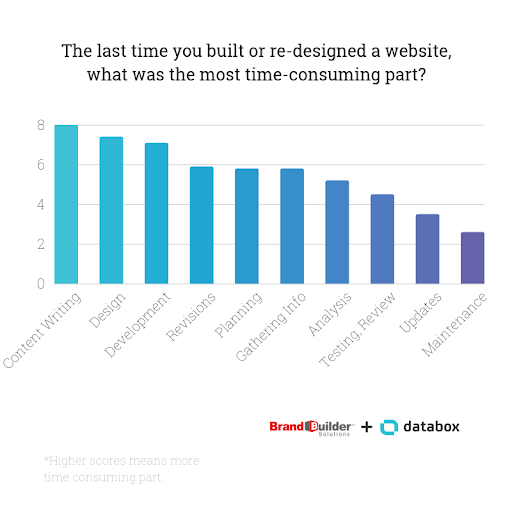
It’s important to understand how the content development process will go.
Mary Ann Hegvold from 30 Degrees North suggests getting right to the point by asking “How will the content be created for the pages my new website?”
“[W]e recommend you have professional writers interview your subject matters experts (SMEs). It results in better copy quicker than asking SMEs to write it. Why? Writers are able to take the point of view of a target buyer without getting too deep into the weeds.”
Steve Latronica says that, in the experience of SL Development, “the number one thing that holds website projects up or is a huge factor in failed projects is the execution for content.”
“It is important to focus on content from the start. Crafting content should be a central part of a website project and how it is handled needs to be very clear for the customer. If that is not going to happen it may be a red flag.”
“[Clients] should hear that there is full support for content creation, in whatever capacity best fits the client/business situation. That does not mean that the agency needs to create the content if the expertise and bandwidth is available in-house or through another agency. But, if necessary, the firm should be able to support the development of new content.”
Can You Show Me Your Previous Work?
“The one question to ask any design/development firm,” says Chris Lee from RankXL, “is: May I speak to a few clients you've worked with recently?”
“A reputable firm should be able to confidently hand over a list of recent clients for reference. If they're uneasy about it or asking you why you would need something like that, that's a bad sign.”
“It's very tough to know whether a firm will do good work for you without speaking with people they've worked with in the past. It will give you a much more candid idea of what to expect.”
Richard George from Print4Hospitality also asks for contact details of previous clients:
“Genuine development agencies will be more than happy to give you contact details of people they have done work for recently. If you meet with resistance they may have something to hide.”
You should also look at examples of the firm’s previous projects, says Growth Hackers’ Jonathan Aufray. “The company should show a few examples of websites they've done in the past. They should not stop there. They should tell the prospect details about the development such as time spent on the project, results achieved, technologies used, etc”
Orbit Media’s Andy Crestodina digs deeper, looking for analytics from sites built for similar companies.
“Their eyes should light up when they hear this question. They should be eager to create screenshots of the before and after results for similar companies.”
“Look for the impact,” says Crestodina. “The search traffic before and after. The conversion rates before and after. Go beyond pretty designs. Ask for cold, hard ROI calculations. The company that gives you this won't lose sight of the results during the design process. They understand both beauty and brains.”
“The best indication of future performance is past performance.”
How Easy Will It Be to Update the Site After The Project is Done?
“The digital world is changing constantly so it's important to understand how your new website firm will enable you to maintain and make updates to your site and how user-friendly that Content Management System (CMS) actually is,” says Twenty Over Ten’s Amanda Larson.
Sam Underwood from Futurety agrees. “We would expect that a good web development agency would utilize a common industry CMS to build a site (Wordpress is our common preference). These platforms have excellent online resources for support and a wealth of plugins to meet future business needs.”
Jerome of Brand Builder Solutions highly recommends using a CMS that is supported by a Company, “With Wordpress or other open source systems, any number of things could go wrong, especially if you (or your agency) aren’t staying on top of updates. We have built 100s sites on these systems as well as HubSpot. We have never had security or update issues with HubSpot. In fact, they are always working on improving it. If HubSpot is outside of your budget, try other software-as-a-service CMS companies like Squarespace, WIx or Weebly.”
Andrew McLoughlin from Colibri goes a step further and asks “Once the site is built, how will you train ours or our client's own staff to make upkeep as seamless as possible?”
“Little things, like the physical location of the host server, can play a big part in troubleshooting and efficient performance. If your contract with a web developer doesn't include ongoing maintenance, then any developer you hire should have a clear plan in place to make that ongoing upkeep possible for your own staff.”
“Like handing off the baton in a relay, the transfer is one of the most important parts of ongoing day-to-day operations.”
David Freund from Junto says that “Far too often, clients are required to pay hefty maintenance fees because an agency didn't design the backend of the CMS with the end user in mind (aka the client).”
A Few More Questions to Consider
Several marketers suggested other questions that don’t fit nicely into categories, but are still worth asking. These are questions that will give you more insight into how your design or development agency will work with your company.
For example, Jake Fisher from Bridges Strategies recommends asking “Is a website more like a physical object or a business process?”
“Most web development & design companies treat a website project like a construction company treats a new building project,” says Fisher. “There are loads of planning sessions, blueprints, three rounds of revisions, subcontractors, a fortune in sunk costs, and, in six months, finally, the doors open to a new website.”
“This is a bad paradigm. Unlike brick-and-mortar buildings, websites are not constrained by the physical world. They are virtual; they are data on a server. It is smarter to build a basic website, measure how users interact with it, and then optimize and add features based on user feedback.”
Here are a few more questions you might ask:
-
“Why are you different from a freelancer?” (Sebastian, Grupo Estructurando)
-
“Who are the specific individuals who will be working on my project?” (David Jackson, FullStack Labs)
-
“Do you include analytics setup as part of the overall planning and or testing of a new digital property? Will my Google Analytics goals, events, and more be [OK]?” (Thomas Bosilevac, MashMetrics)
-
“How will you gather and use data in the design of our website?” (Rick Kranz, OverGo Studio)
-
“Do you offer any follow-up services?” (Charlie, Imaginaire Digital)
-
“How much does a website cost?” (Randy Mitchelson, iPartnerMedia)
-
“What specifically is, and is NOT included in the scope of development?” (Donna Duncan, B-SeenOnTop)
-
“Will I be able to tell you exactly what I want in a website and you will make it come to life?” (Nick Leffler, Exprance)
Leffler points out that you shouldn’t look for a simple “yes” answer to this question. Instead, prioritize a designer that answers this way:
“I will be able to make your dream website come to life but that won’t help you. I build websites that help businesses succeed. They're a tool for making you more money and I want to ensure your wishes are balanced with this goal. A pretty website doesn't always sell your business well.”
“A good web designer isn't a fast food restaurant employee where people order what they want from a menu and we deliver just that,” says Leffler. “Each project is unique and there’s a lot of subtle knowledge and expertise behind web design. A good web designer won’t take orders, they’ll add value to make sure your website meets exceeds goals and does great things for your business.”
Clarity Results in Great Websites
“We start with the simplest yet scariest question,” says Dennis Seymour of SeriousMD:
“I need X. Tell me how you will do it?”
“A good development firm,” says Seymour, “will share their vision on what they could with your requirements and explain in detail as to how they are going to do it in the simplest possible way. If they put a lot of fluff in their answer, then that's a clear sign that you need to look into their company processes more and check past clients.”
Before you hire a web design or development firm, get clear on what you’ll be getting. Make sure you understand how the work will get done, how you will work with them, and what you can expect throughout the entire process -- from before you hire them to after they are done the job.
If you can do that, you’ll be starting a great relationship that will lead to a great website.

